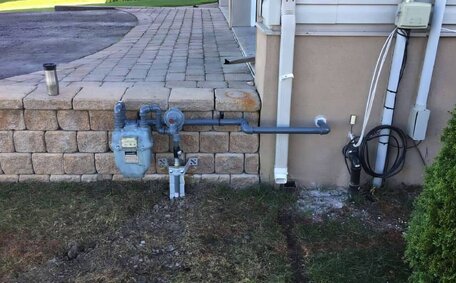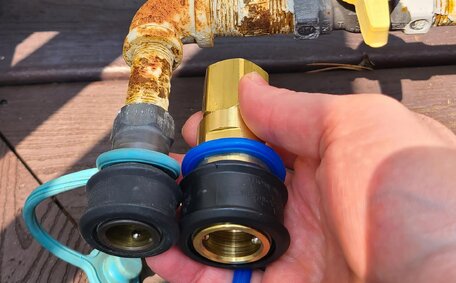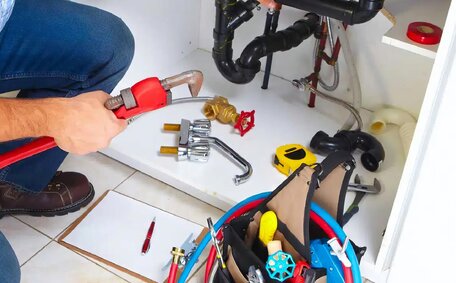Introduction to Pipe Relining Safety
When it comes to plumbing and pipe repair, safety should always be the top priority.
At Marsfield Plumbing, located in Marsfield, Sydney, we are committed to following rigorous safety protocols during all our trenchless pipe relining projects.
When considering pipe relining vs traditional repair methods, the materials used, such as epoxy resin, can be toxic if handled incorrectly. Our technicians skilfully install new pipes via trenchless methods, using protective equipment and ventilating work areas to avoid hazardous fume exposure. All crew members are fully licenced, insured and trained in confined space entry procedures, ensuring the pipe inside old structures is comprehensively and meticulously repaired.
We use CCTV footage for thorough inspections to identify precise repair areas before commencing any pipe relining job.
This assessment helps identify sections suitable for relining and any risks linked to your plumbing system’s layout and materials. We thoroughly explain all safety concerns, including those specific to cast iron pipes, and outline the process from start to finish for property owners.
During the relining pipe cleaning phase, we take precautions to capture any debris removed to avoid spillage into the environment. Sanding equipment is equipped with dust collection systems. Proper ventilation protects against airborne particulates both indoors and outdoors.
Whenever epoxy resins or a pipe liner’s curing agents are used on an existing pipe, we follow the safety data sheet (SDS) instructions exactly and contain any potential spills or drips. We also post hazard signage as an extra precaution. Once the epoxy pipe lining completes the curing process, it becomes inert and no longer poses any health risks.
In the rare event of an emergency plumbing situation, our crew ensures all areas are cleaned up after their work, maintaining exemplary service in first aid response and site tidiness. Our very professional staff takes all reasonable precautions to keep themselves and our customers safe throughout the entire pipe relining process.
We also have all necessary fire safety equipment on hand, prepared for any pipe replacement or relining situations that may arise. If you have any questions or concerns, please don’t hesitate to contact your plumber from the Marsfield team today.
Safety Gear Needed for Pipe Relining
To ensure a safe pipe relining project, professionals must use specialised protective equipment at all times. Here are some of the essential safety gear items required:
- Hard Hats - Protects the head from any falling debris or hazards overhead.
- Safety Glasses/Goggles - Prevents eye injuries from chemical splashes, dust, debris, etc.
- Ear Plugs - Reduces noise exposure from equipment like sanders, grinders, etc.
- Dust Masks/Respirators - Filters out dangerous respirable particles released during cleaning and grinding.
- Chemical-Resistant Gloves - Prevents skin exposure to toxic resins, solvents and curing agents.
- Coveralls/Tyvek Suits - Creates a protective barrier against body contact with hazardous materials.
- Steel Toe Boots - Protects feet from heavy objects, sharp debris, chemical spills, etc.
- Knee Pads - Comfortable cushioning when kneeling on hard surfaces for extended periods.
- Safety Cones/Signage - Warns others to avoid work area for their own safety.
Our office requires that technicians wear protective gear at all times when utilising trenchless relining technology. Adhering to safety protocols reduces risks and contributes to an efficient, incident-free project.
Assessing Risks and Inspections Before Relining
Before starting any pipe relining project, it is crucial for plumbers to thoroughly assess potential risks and inspect the site. At Marsfield Plumbing, we offer meticulous planning and comprehensive solutions to ensure safety for our technicians and clients, especially when working on the main sewer line.
We conduct in-depth CCTV inspections to identify problem areas, blockages, cracks, or leaks in pipes. This allows us to pinpoint the sections needing repairing damaged areas, like a blocked drain, and plan our relining process accordingly. We identify obstructions such as tree roots and hazardous materials needing special handling.
We evaluate the accessibility and layout of the pipes to ensure our work won’t damage or necessitate excavating your yard. Technical challenges like tight bends or long pipe runs may require additional equipment or adjustments to our standard procedures. Understanding the unique specifications of each plumbing system can help us map out a safe workflow.
We also assess environmental factors that could impact safety. Our team confirms the stability of foundations, walls and entry points to avoid collapses or shifting during the relining process. The meticulous way we execute proper flow diversion methods is crucial to keep sewage from backing up into the work area.
At Marsfield Plumbing, we take every necessary precaution to protect our crew and your property during pipe relining. Our safety-focused inspection and planning processes aim to identify potential hazards so they can be addressed before work begins. We’re committed to minimising risks to deliver seamless, incident-free relining services, ensuring that you would confidently use them again for future needs.
Handling Relining Materials Safely
Appropriate personal protective equipment like chemical-resistant gloves and goggles should be worn to prevent skin and eye exposure when handling raw materials.
Measurement tools allow technicians to portion the right amounts precisely. Care should be taken to avoid drips or spills during the mixing process.
The application area must be well-ventilated, as it forms a crucial part of the way we ensure safe pipe relining, to prevent hazardous fume buildup. Once the epoxy cures fully, it presents no additional risks.
Folloecifications and application methods recommended by the manufacturer. This ensures the materials cure properly for maximum strength and longevity.
The resin-soaked liner must be inserted into the cleaned pipe, with each step adhering to strict timing guidelines. This step is more precise than traditional methods, essential in pipe relining Sydney services, ensuring the epoxy has not begun hardening prematurely before installation. Proper saturation and compression of the liner is also critical.
Precise resin amounts, impregnation techniques, liner insertion speed and curing times dictate long does pipe relining takes, as outlined in detail by manufacturers. Strict adherence minimises risks of leaks, blockages or other application issues, ensuring the safety and effectiveness of the relined pipes. Correct methods allow the new lining to last 50+ years.
Our licensed technicians are highly skilled and dedicated, applying materials precisely as specified and ensuring customer satisfaction. By following precise methods, we deliver the highest quality results safely.
Using Proper Ventilation
Effective ventilation is crucial during pipe relining to protect workers and homeowners from hazardous fumes, including in the hot water system. The epoxy resins and chemical curing agents used in the process, including those for hot water pipes, can emit toxic vapours. Without adequate airflow, Fumes from the plumbing pipe materials can accumulate to dangerous levels, posing serious health risks.
At Marsfield Plumbing, when you inquire about pipe work, our technicians inform you about how they take ventilation very seriously on all relining jobs. We first ensure the property is unoccupied during the process of repairing any damaged pipe. We then set up exhaust fans and open windows around the work area to create directed airflow that effectively removes fumes.
For indoor sections, we use thick plastic sheeting to isolate and ensure that pipes can be worked on without needing to be dug up, in a contained work zone. This allows us to vent fumes safely to the outdoors without affecting the sanctuary of your home. We monitor air quality continuously using gas detectors to ensure concentrations remain at safe levels.
Outdoor ventilation is created without the mess of digging up your property, by strategically placing exhaust equipment. Enclosures around manholes or access points also help direct fumes away through ducting. We advise residents to close all nearby windows as an extra precaution throughout the project.
Our crew, skilled in pipe relining, wears respirators to prevent inhalation exposure, demonstrating our commitment to safety. Proper PPE, planning and thorough drain cleaning and continuous monitoring ensures air quality is safe for both workers and property owners during the relining process. We take every measure to isolate and remove hazardous fumes for a seamless, incident-free pipe renovation.
Cautious Pipe Relining Process Steps
When undertaking pipe relining, safety should be the top priority during every step of the process. Here is an overview of the key steps involved and the precautions taken at each stage:
- Site Evaluation - A thorough risk assessment is conducted to identify potential hazards. We inspect structural stability, pipe layout, and accessibility to address issues like broken pipes and blocked drains.
- Pipe Cleaning - Before lining, accumulations and blockages in damaged pipes are safely removed, with debris containment protocols followed.
- CCTV Inspection - Detailed internal pipe scans localise damaged sections and allow safe process planning.
- Flow Diversion - Sewage flow is temporarily diverted away from the work area with mechanical plugs.
- Liner Impregnation - Epoxy resins are cautiously handled and measured before liner saturation in a controlled, ventilated environment.
- Liner Insertion - The liner is carefully introduced, with the goal of securing the liner into the host pipe according to specified timing and compression procedures.
- Curing and Completion - Strict post-insertion protocols are maintained until full curing takes place, after which all equipment is safely removed.
Our fully trained and certified technicians execute pipe relining with care and expertise, understanding all necessary precautions. We are committed to delivering the highest quality pipe renovation with safety as our topmost priority.
Quality Checks and Assurance After Relining
Once pipe relining is complete, our technicians perform several quality checks to ensure the job done is effective and that the sewer pipes indoors are safely repaired. We conduct a final CCTV inspection, including sewer storm water systems, using the footage to verify that the new pipe lining has cured properly and adhered smoothly throughout the entire length.
We carefully check sewer pipe interiors for any remaining cracks, leaks or weak points needing touch up.
We can also perform rigorous water pressure tests by filling the pipes and attentively monitoring for any significant drips or drops in pressure. For drain lines, we flush the system, running water through multiple times to check flow and drainage. If any issues are detected, we immediately address them to meet our stringent quality standards.
At Marsfield Plumbing, We guarantee long-term reliability from our relining work, ensuring our services meet both budget and performance expectations. Our epoxy liners, when properly applied and cured, did great job at ensuring durability for 50+ years. We back up our workmanship with warranty coverage, a key reason why customers frequently recommend them for peace of mind.
If you ever have any concerns with our pipe relining services, please contact our office promptly so we can inspect and provide a remedy to the situation.
By prioritising safety and quality assurance, there no shortcomings in how we deliver professional plumbing renovations that stand the test of time. Our inspections, pressure checks and flow testing provide the assurance you need to recommend them for further relining projects. Contact our team today to learn more about our commitment to meticulous, high-quality pipe repair method services for residential and commercial properties.
Answering Common Relining Safety Questions
Pipe relining is a very safe process when performed by trained professionals like our team at Marsfield Plumbing. Here are answers to some common safety questions we receive:
Is pipe relining hazardous to the environment?
No, we take steps to safely contain any debris removed from pipes to avoid spillage. We also use ventilation to direct fumes away from homes and properly dispose of all hazardous materials offsite after curing. The final epoxy lining is inert, ensuring there are no ongoing chemical hazards.
Could relining damage my home’s foundation or structure?
Our thorough site inspection and planning ensures relining won’t compromise foundations or walls, even when dealing with old pipes. We evaluate stability and make any necessary adjustments to avoid shifts or damage.
How do you protect homeowners from chemical exposure?
We isolate the work area with plastic sheeting and vent fumes outdoors. We advise residents to vacate premises during our plumbing services process as an extra precaution. Our crew wears PPE to prevent exposure, maintaining our high standards about pipe relining safety.
What risks are involved with handling the epoxy resins?
Epoxy can irritate eyes and skin, so technicians wear protective equipment when handling your pipes. We follow all manufacturer safety guidelines and contain any spills. Once cured, epoxies are inert and safe.
Could pipe relining cause sewage backup into my home?
There’s no worry, as we temporarily divert sewage flow away from the pipes using mechanical plugs. This prevents any wastewater backup into the property during repairs.
Our extensive training and adherence to safety protocols ensures that when I called for drain pipe relining feedback, the process was reported as low-risk with no issues. I called the team ourselves and we’re happy to address any additional questions or concerns you may have. Contact Marsfield Plumbing today to find out more.
Conclusion
Pipe relining requires diligent safety protocols to protect homeowners, professionals and the environment. Our team at Marsfield Plumbing follows precise and cost effective methods and best practices at every project stage, outperforming traditional pipe repair – from initial risk assessment to quality post-repair inspections, all while mindful of delivering competitive pipe relining cost. Utilising protective gear, containment, and ventilation, this process is not only more efficient than pipe replacement but also more cost-effective while ensuring a seamless and safe outcome.
Understanding the benefits of pipe relining ensures homeowners can trust in the integrity and longevity of the service. We encourage those looking for services where you can receive a free quote for assistance with ageing or damaged plumbing to contact Marsfield Plumbing for safe, effective pipe renewal solutions.
With over 50 years collective experience, we are industry leaders in relining. Our qualified technicians turned up, undeterred by any unforeseen challenges, to deliver the highest quality results throughout the Eastern Suburbs while prioritising safety above all else. Contact us to learn how you can swiftly get your pipes serviced.






